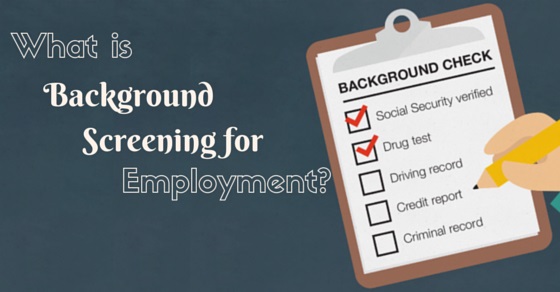CareerBuilder.com undertook a survey where 49% of hiring managers had found that job applicants have fabricated some portions of their current resume.
The Wall Street Journal in an article had published the fact, that nearly 34% of all resumes contain certain lies which could be about the applicant’s education, work experience and other skills.
As an owner of a company you are recruiting a person for his or her specific skill. However if you find in due course of time that, the applicant does not have the required specific skill needed, you are in a fix.
In order to avoid these most companies nowadays undertake background screening of new employees.
 Below we have discussed what background screening of employment is and what are the areas in which a company can check its new employee data.
Below we have discussed what background screening of employment is and what are the areas in which a company can check its new employee data.
Background Screening – How to do?
What is the Fair Credit Reporting Act?
When a company employs a third party to do the background check for an employee, the background check would fall under Fair Credit Reporting Act or FCRA.
FCRA has defined the fact that a company can undertake an employee background check like a consumer report.
Also before the check begins the concerned employee has to be informed and he has to give a written authorization for it.
Should the new employee be worried about his background verification process?
Nolo.com in a survey indicated that 11% of job applicants have not revealed the real reasons regarding why they left their last job.
If you as an employee do not fall in this category, you should not worry about background checks. However, if you have fabricated a few facts in your resume, then you should be concerned as to what data would surface, after an extensive background check process.
The National Consumer Law Center in this regard has expressed concerns regarding criminal records or history of an employee and how it would affect his current job.
What happens if a company finds that an employee has a criminal history?
EEOC of the U.S. Equal Employment Opportunity Commission has clearly stated that the use of an employee’s criminal history would violate Title VII of the Civil Rights Act of 1964.
Here in its various guidelines, the EEOC has asked the employer to consider the nature of the crime committed, the period which has passed from the crime committed and the current role of the job, the employee is undertaking.
Here the employers are helped with the best practices that they should undertake in these circumstances.
What are the various verifications undertaken in a background screening for employment?
Background checks can be simple like verifying the Social Security number of the employee to an extensive work and academic verification procedure.
Most checks cover the basic employment verification records explained below:
- The driving history of an employee. Here the registration of the employee’s vehicle is also checked.
- The verification of Social Security number.
- The credit history of the employee and if he has a mortgage, then they would study how consistently he has paid the loan.
- For some job positions, criminal background check for employment of an employee would be done. Here his court records and also if he has faced a situation of bankruptcy would be checked. If the company feels that there is a need, character reference check and interviews with his neighbours and friends might be undertaken. The Society of Human Resources Management has indicated that 5% Americans face violence in their workplace annually. Thus the employee names are also checked in the sex offenders list.
- The educational data of the person would be verified.
- The details of their last compensation drawn and their current medical records are also checked. Here the company might undertake a drug test if necessary.
The nature of the job the employee undertakes would determine to some extent the detailed background check policy undertaken by the company.
What are the details which cannot be checked in a background check?
FCRA or Fair Credit Reporting Act has outlined a few guidelines for employee background checks.
But the regulations of FCRA are followed by third party background check companies and companies who undertake in-house background checking may or may not follow FCRA guidelines.
However, states like California have strict regulations which are followed regarding employee background verification. FCRA has clearly outlined a few details which cannot be featured in a complete background check of an employee. Some of these are:
- If an employee has suffered from bankruptcy 10 years ago, it should not be featured in the check.
- Any civil or criminal acts which was conducted seven years before.
- Tax liens and accounts which had been placed for collection, after a period of 7 years.
- Any form of negative data which is 7 years old. Here criminal conviction data has to be mentioned and checked. If you are in California then you would enjoy the 7-year rule for criminal convictions too, as they are known as “rap sheets” and these records are not shared with the public.
Are personal records confidential in nature?
As an employee, you might consider certain personal records to be private in nature. The FCRA has outlined a few personal data which can be requested by the hiring company from your end. These are:
- Educational Data: Federal law maintains that educational data are confidential in nature. Without authorization, the school should not share confidential data. But here the school can share details like name of the student, the attendance of the student and the degree he undertook and various activities are undertaken by him. If the employee has given a written mail for not sharing these data, then the school will not share these data with the concerned agencies.
- Military service data: If a company wants to check if an employee has undertaken military service, then this would be difficult unless the conditions are very necessary. This is because military service data is protected under Federal Privacy Act.
- Medical Data: The FCRA guidelines have stated that you would need special permission if you want to check the medical records of an employee. However, the Disabilities Act would help a company to enquire if you can undertake a specific job for which you have applied.
Which agencies conduct these background checks?
Now that a basic idea regarding complete background screening for an employee has been achieved, we have to discover who conducts these background checks. Many companies undertake background checks for an employee.
In the US, the National Association of Professional Background Screeners shares an exhaustive directory of background screening companies which undertake employee screening and maintain the necessary quality standards needed.
Sometimes large global companies also have their in-house checking cell which is based on the structure of a third party background check company.
To Wrap Up:
In the end, it should be noted that the main need for undertaking a background screening for employment is to ensure that the employee recruited is productive for the company and also that he has the credentials to do the work well.
Otherwise, a bad fake recruit would create a lot of problems for his employer. Please feel free to add your feedback on the above discussion.
If you have any points do mention them, as it would add to valuable insight to the topic discussed above.







































